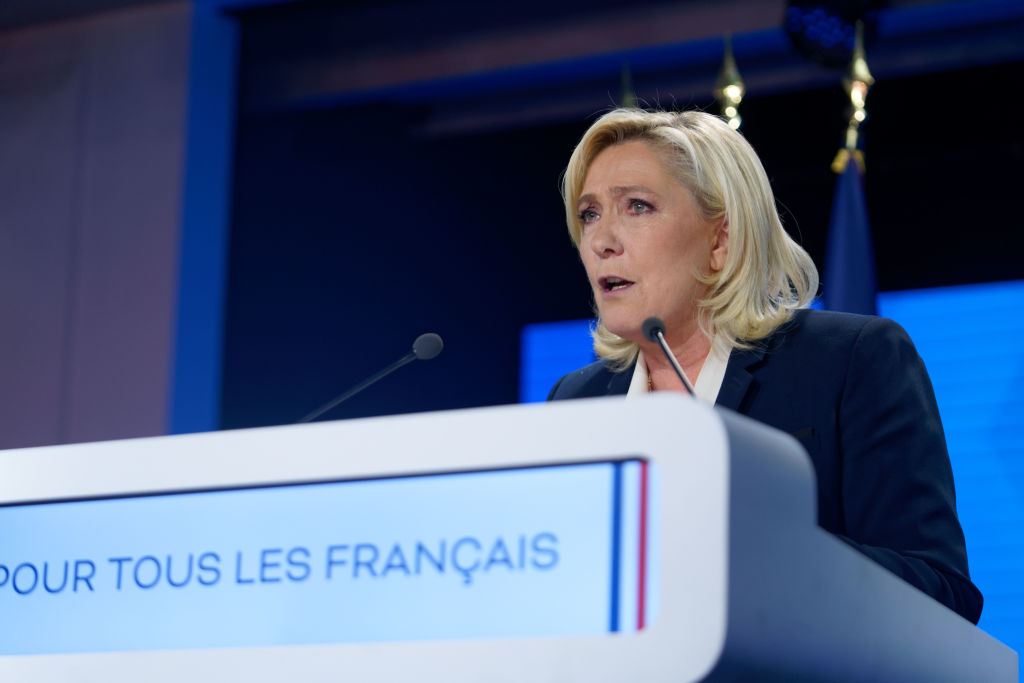Following her second-round loss to Emmanuel Macron in France’s presidential elections last month (it was her third loss on the national stage), Marine Le Pen has announced her candidacy for the National Assembly. She hopes to win Pas-de-Calais’ eleventh constituency in June — a seat she won in 2017 — to oppose Macron’s policies in the French parliament, along with her National Rally (RN) colleagues. But she is unlikely to have much leverage.
In the last parliamentary elections, the National Rally (then the National Front) won eight seats out of 577. The latest poll by Harris Interactive has them winning 65 to 95 seats this year, compared to 338 to 378 seats for Macron’s re-branded Renaissance party, which would give Macron an absolute majority.
While sixty-five seats would be a huge improvement for the National Rally, the possible improved showing also serves to highlight Le Pen’s failures as a politician. For much of Macron’s five years in office, a majority has disapproved of his job as president. During his first six months in office, Macron had an approval rating of around 53 percent, but by January 2018, he was underwater and has never had a positive rating since. Before the 2022 elections, Macron had a 56 percent disapproval and 42 percent approval rating.
Despite this, Le Pen only fared marginally better in the presidential elections. In 2017, she won 33.9 percent of the vote to Macron’s 66.1 percent. Last month, she won 41.5 percent. While the appeal of the National Rally may be limited, a savvier and more informed leader could have done more with their platform than Le Pen did. Throughout her campaign, she tried to be like a kinder, gentler National Rally candidate, but this made her seem like another politician. In her only debate with Macron — a nearly three-hour slugfest on April 20 — she looked nervous and out of her depth. It was better than her performance in 2017, but it highlighted how far she still has to go to become a threat to Macron. She likely never will.
Jean-Luc Mélenchon, on the other hand, did far better than expected in the presidential elections, narrowly missing out on second place in the first round with 22 percent of the vote to Le Pen’s 23.2 percent and Macron’s 27.8 percent. A critic of the European Union, like Le Pen, Mélenchon called on the French to pressure Macron to appoint him prime minister by supporting his France Insoumise party in the parliamentary elections. He recently formed a coalition with the Greens, Socialists, and Communists in an attempt to thwart that absolute majority, but they would land at most 100 seats according to the latest poll — far short of what they need to stymie or pressure Macron.
Macron has his faults — many, in fact. He’s arrogant and does silly things like play dress-up and feign emotional exhaustion after another phone call with Putin fails. (When Macron was negotiating with Putin, commentators thought Putin was using Macron to stall other Western governments, but maybe Macron was using Putin?) Like Justin Trudeau, he’s a man-boy at the head of one of the West’s most influential democracies.
But he’s also competent. He knows his stuff, and while he is terrible at selling himself to the French people, he has made some principled if unpopular decisions that have attempted to address France’s many economic woes. This has won him support from former supporters of the Republicans, who are also in a crisis.
And until the other parties and candidates seem at least as competent, Macron will continue to win.


















